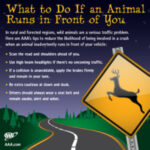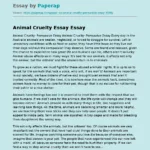Throughout human history, the relationship between people and animals has oscillated between reverence and exploitation. At the crux of this dynamic lies a profoundly vexing question: should the act of killing an animal be classified as murder? To engage with this topic necessitates a multifaceted exploration of ethics, legality, and emotional resonance, bearing in mind that what may initially appear to be a straightforward query is interwoven with layers of complexity.
In many jurisdictions, murder is strictly defined as the unlawful killing of a human being, affording no legal recognition to the same act against non-human life forms. This distinction is rooted in anthropocentrism, a worldview that positions humans at the pinnacle of moral consideration. Animals, within this framework, are often perceived as mere resources or tools for human benefit—an ideology that has prompted extensive debates regarding animal rights and welfare.
However, as society evolves, so too does our understanding of animals and their intrinsic value. **Philosophical perspectives** regarding animal ethics, particularly those posited by thinkers such as Peter Singer and Tom Regan, challenge the conventional narratives that trivialize animal lives. Singer’s utilitarianism advocates for the consideration of suffering, irrespective of species, while Regan posits that certain animals possess inherent value. This philosophical pivot raises a pivotal dilemma: if animals experience pain and emotions comparable to those of humans, does not their killing warrant similar moral scrutiny as murder?
The act of killing an animal fundamentally disrupts complex ecosystems, potentially leading to the decline of species and the destabilization of habitats. This ecological perspective broadens the scope of inquiry; it raises concerns not just about the individual animal but about the collective impact on biodiversity. Ecologists recognize that each species plays a role in maintaining the balance of its environment. Hence, the question morphs from a simple act of killing to a broader discourse on stewardship and responsibility.
Moreover, the emotional connections humans forge with animals can significantly influence perceptions surrounding their killing. For instance, pets such as dogs and cats tend to evoke sentiments of familial love, while livestock animals like cows and pigs often face stark realities during their lives. The juxtaposition of these relationships illustrates a societal hypocrisy. The sorrow inflicted by the loss of a beloved pet juxtaposed with the indifference towards the suffering of farmed animals elucidates an uncomfortable truth: our feelings about animals often hinge on familiarity and utility rather than a consistent ethical framework.
Deepening the inquiry necessitates a consideration of cultural attitudes toward animals. In various societies, animals bear profound spiritual significance. For some Indigenous cultures, the relationship with non-human life is deeply intertwined with beliefs, philosophy, and survival. Killing an animal within these contexts could be viewed not purely as an act of consumption but as a ritual imbued with respect and gratitude. Contrastingly, factory farming practices epitomize a systematic devaluation of animal life, raising the ethical stakes concerning the nature of killing in the modern world.
Legal frameworks reflect societal values. As jurisdictions across the globe grapple with calls for animal rights legislation, the conversation around whether killing an animal should be considered murder gains traction. In some regions, laws are evolving to reflect a growing recognition of animal sentience. Sentencing models that differentiate between animal cruelty and other forms of homicide signal a subtle shift in societal conscience. Aspects of restorative justice and ecological ethics are now being intertwined with legal definitions, challenging long-held assumptions.
It is crucial to examine the motivations behind killing animals. When the act stems from necessity—such as for food, safety, or conservation—does it possess the same moral weight as instances of wanton cruelty or recreational killing? The exploration of this distinction propels discourse toward critical ethical considerations: necessity versus want. Additionally, there is a burgeoning recognition of sustainable practices that honor life rather than extinguishing it. Hunting practices that ensure ecosystem balance and respect for animal populations may propose a different categorization from poaching or illegal wildlife trade.
The psychological impact of killing animals also merits attention. Individuals involved in animal slaughter, whether in industries or hunting scenarios, often face mental health challenges, such as PTSD or cognitive dissonance. This psychological toll indicates a deeper conflict between societal norms and personal morality. These reflections underscore the necessity for empathy in discussions surrounding animal death and highlight the multifaceted implications of our choices.
Ultimately, recognizing that the killing of an animal elicits a spectrum of emotional responses and ethical considerations allows for a richer understanding of humanity’s role within the natural world. Should killing an animal count as murder? While current legal frameworks may exclude such classifications, evolving societal perspectives on animal sentience, ecological responsibility, and emotional connections underscore the need for a nuanced discourse that expands beyond black-and-white categorizations. Definitionally, murder is intrinsically linked to the ethical value we ascribe to life. Therefore, as society engages with the growing discourse surrounding animal rights and ethics, the very definitions of life, death, and moral accountability may continue to evolve.
In summation, the inquiry into whether killing an animal should count as murder is not merely a question of semantics; it is a reflection of broader societal values, ethical frameworks, and ecological interdependencies. Our relationship with non-human life not only shapes individual identities but also frames collective moral consciousness. As we traverse this complex landscape, it is imperative to approach the conversation with empathy, reflecting on our own beliefs and responsibilities in regard to animal welfare.










